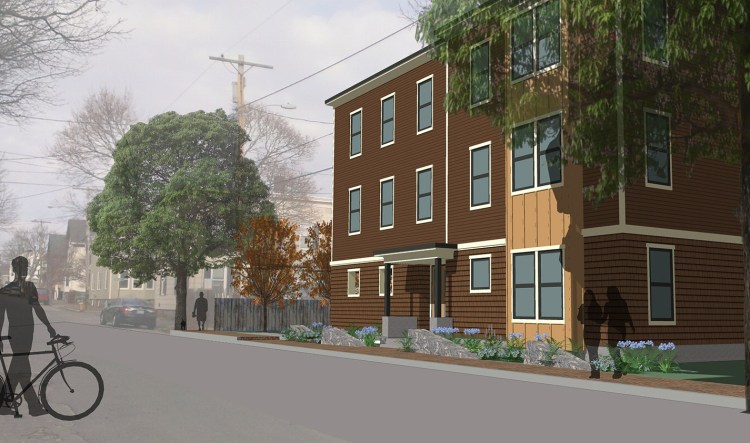A group of property owners on Munjoy Hill is asking a judge to send an affordable housing development back to the drawing board.
The six property owners, only one of whom is a year-round Portland resident, contend that an eight-unit affordable housing project at 65 Munjoy St. does not comply with height and design standards, in a lawsuit filed in Cumberland County Superior Court. The lawsuit also claims the city did not follow the proper process for vetting the proposal by Adam’s Apple LLC before it was approved by the Planning Board on Feb. 9.
“The Planning Board’s approval of the Adam’s Apple project is therefore arbitrary, capricious, legally erroneous and unsupported by the substantial and competent evidence in the record,” says the lawsuit, which asks the judge to vacate the approval or remand the project back to the board for further review.
The lawsuit is the latest example of resistance by some neighbors to increased development on the Portland peninsula. After years of limited growth, Portland is undergoing a surge in development at a time when housing – especially for low- and middle-income earners – is in short supply. The shortage is driving up rents and providing an incentive for landlords to upgrade their properties, prompting fear that some residents will be priced out of the city.
Developer Ethan Boxer-Macomber, a principal in Adam’s Apple, said the lawsuit appears to have been filed because a few people didn’t like the design, which he said evolved throughout the planning process in response to feedback from the public. He said the lawsuit will delay the project, which was originally scheduled to begin this spring.
“We were really excited about the chance to provide high quality housing to middle-income people and do a quality infill project. This, of course, has brought the project to a screeching halt, which is unfortunate,” Boxer-Macomber said.
The plaintiffs in the case are: Pennsylvania residents Matthew Thayer and Margaret Hazlett, who own 62 Munjoy St.; New York residents Abigail Lloyd, who owns 66 Munjoy St., and Alexandra Nimetz, who owns 61 Wilson St.; Saco resident Justina Marcisso-Hussey, who owns 63 Vesper St.; and Portland resident Jan-Marie Lindholm, who owns 52 Moody St. Thayer is a former co-chair of the Adams School Re-use Committee, which helped establish the criteria for redeveloping the site. The plaintiffs are represented by Biddeford attorney Keith Jacques.
The city of Portland is also named as a defendant in the lawsuit.
“We’re confident the Planning Board didn’t err in its approval and we’re responding to the appeal in the normal course,” said Jessica Grondin, the city’s communications director.
The project at 65 Munjoy St. is on the site of the former Marada Adams Elementary School and is in the second phase of the redevelopment. The first phase included the demolition of the school on the city-owned parcel and the construction of 16 units of affordable, owner-occupied housing by Avesta Housing, on about three-quarters of an acre. The project also included a public park.
The city began seeking proposals in 2014 to develop the site of a small parking lot on the property. Adam’s Apple was the only developer to respond. It originally submitted a concept drawing for a single building designed to look like two buildings, because that’s what the city requested. The final design looks more like a single building.
The plaintiffs argue that the city and the developer should have done more outreach to the neighborhood after the design changed. They also criticize the board’s conditional approval, which they say allowed the developer to work with the city staff to adjust the design without public comment and claim the project does not meet the requirements of the R-6 zone, in the context of the city’s request for proposals.
Boxer-Macomber said Adam’s Apple is still committed to the project, which will provide an opportunity for a middle-income family to afford to a condo on Munjoy Hill, which is experiencing the city’s sharpest increase in real estate values.
Only individuals and families earning as much as 120 percent of the area’s median income, about $74,000 for two people and $92,000 for a four-person household, would be eligible to buy the units, which were originally priced at roughly $250,000 to $300,000. That’s about $50,000 to $80,000 below market rate, he said.
The delay, however, could push prices up, Boxer-Macomber said, as construction costs and interest rates continue to rise. The project was originally estimated to cost $1.7 million. “What this delay is going to do is add costs and make these units cost more for the buyers,” he said.
Send questions/comments to the editors.



